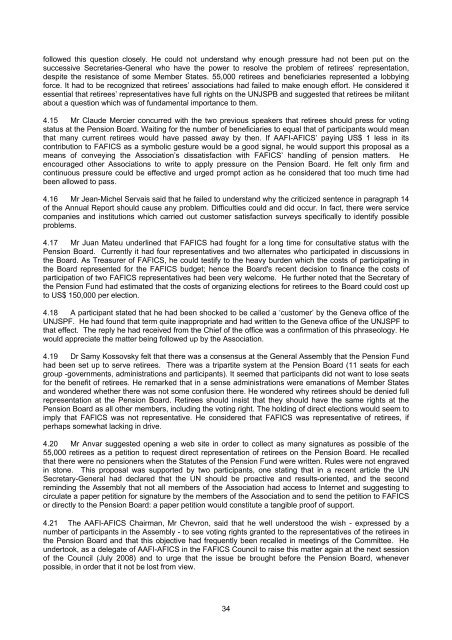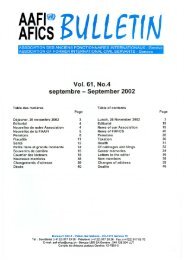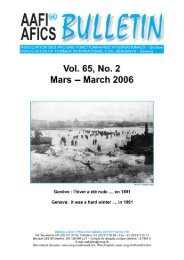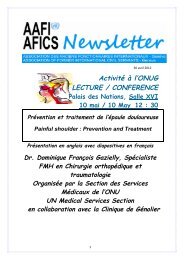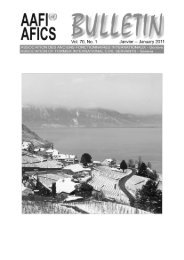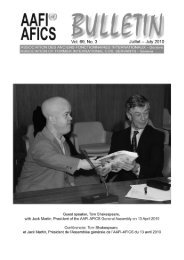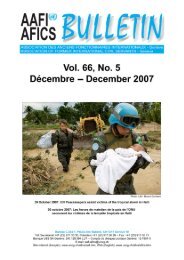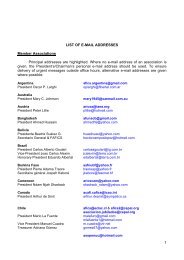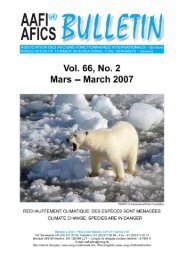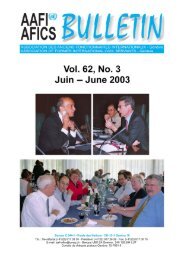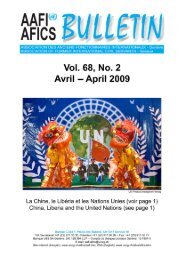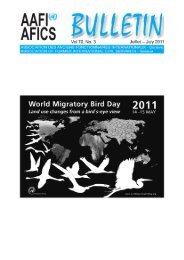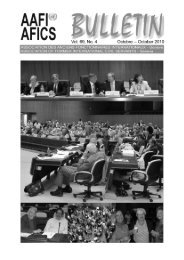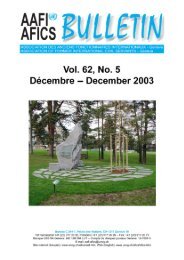VOL. 67, NO. 3 - AAFI-AFICS, Geneva - UNOG
VOL. 67, NO. 3 - AAFI-AFICS, Geneva - UNOG
VOL. 67, NO. 3 - AAFI-AFICS, Geneva - UNOG
You also want an ePaper? Increase the reach of your titles
YUMPU automatically turns print PDFs into web optimized ePapers that Google loves.
followed this question closely. He could not understand why enough pressure had not been put on the<br />
successive Secretaries-General who have the power to resolve the problem of retirees’ representation,<br />
despite the resistance of some Member States. 55,000 retirees and beneficiaries represented a lobbying<br />
force. It had to be recognized that retirees’ associations had failed to make enough effort. He considered it<br />
essential that retirees’ representatives have full rights on the UNJSPB and suggested that retirees be militant<br />
about a question which was of fundamental importance to them.<br />
4.15 Mr Claude Mercier concurred with the two previous speakers that retirees should press for voting<br />
status at the Pension Board. Waiting for the number of beneficiaries to equal that of participants would mean<br />
that many current retirees would have passed away by then. If <strong>AAFI</strong>-<strong>AFICS</strong>’ paying US$ 1 less in its<br />
contribution to F<strong>AFICS</strong> as a symbolic gesture would be a good signal, he would support this proposal as a<br />
means of conveying the Association’s dissatisfaction with F<strong>AFICS</strong>’ handling of pension matters. He<br />
encouraged other Associations to write to apply pressure on the Pension Board. He felt only firm and<br />
continuous pressure could be effective and urged prompt action as he considered that too much time had<br />
been allowed to pass.<br />
4.16 Mr Jean-Michel Servais said that he failed to understand why the criticized sentence in paragraph 14<br />
of the Annual Report should cause any problem. Difficulties could and did occur. In fact, there were service<br />
companies and institutions which carried out customer satisfaction surveys specifically to identify possible<br />
problems.<br />
4.17 Mr Juan Mateu underlined that F<strong>AFICS</strong> had fought for a long time for consultative status with the<br />
Pension Board. Currently it had four representatives and two alternates who participated in discussions in<br />
the Board. As Treasurer of F<strong>AFICS</strong>, he could testify to the heavy burden which the costs of participating in<br />
the Board represented for the F<strong>AFICS</strong> budget; hence the Board's recent decision to finance the costs of<br />
participation of two F<strong>AFICS</strong> representatives had been very welcome. He further noted that the Secretary of<br />
the Pension Fund had estimated that the costs of organizing elections for retirees to the Board could cost up<br />
to US$ 150,000 per election.<br />
4.18 A participant stated that he had been shocked to be called a ‘customer’ by the <strong>Geneva</strong> office of the<br />
UNJSPF. He had found that term quite inappropriate and had written to the <strong>Geneva</strong> office of the UNJSPF to<br />
that effect. The reply he had received from the Chief of the office was a confirmation of this phraseology. He<br />
would appreciate the matter being followed up by the Association.<br />
4.19 Dr Samy Kossovsky felt that there was a consensus at the General Assembly that the Pension Fund<br />
had been set up to serve retirees. There was a tripartite system at the Pension Board (11 seats for each<br />
group -governments, administrations and participants). It seemed that participants did not want to lose seats<br />
for the benefit of retirees. He remarked that in a sense administrations were emanations of Member States<br />
and wondered whether there was not some confusion there. He wondered why retirees should be denied full<br />
representation at the Pension Board. Retirees should insist that they should have the same rights at the<br />
Pension Board as all other members, including the voting right. The holding of direct elections would seem to<br />
imply that F<strong>AFICS</strong> was not representative. He considered that F<strong>AFICS</strong> was representative of retirees, if<br />
perhaps somewhat lacking in drive.<br />
4.20 Mr Anvar suggested opening a web site in order to collect as many signatures as possible of the<br />
55,000 retirees as a petition to request direct representation of retirees on the Pension Board. He recalled<br />
that there were no pensioners when the Statutes of the Pension Fund were written. Rules were not engraved<br />
in stone. This proposal was supported by two participants, one stating that in a recent article the UN<br />
Secretary-General had declared that the UN should be proactive and results-oriented, and the second<br />
reminding the Assembly that not all members of the Association had access to Internet and suggesting to<br />
circulate a paper petition for signature by the members of the Association and to send the petition to F<strong>AFICS</strong><br />
or directly to the Pension Board: a paper petition would constitute a tangible proof of support.<br />
4.21 The <strong>AAFI</strong>-<strong>AFICS</strong> Chairman, Mr Chevron, said that he well understood the wish - expressed by a<br />
number of participants in the Assembly - to see voting rights granted to the representatives of the retirees in<br />
the Pension Board and that this objective had frequently been recalled in meetings of the Committee. He<br />
undertook, as a delegate of <strong>AAFI</strong>-<strong>AFICS</strong> in the F<strong>AFICS</strong> Council to raise this matter again at the next session<br />
of the Council (July 2008) and to urge that the issue be brought before the Pension Board, whenever<br />
possible, in order that it not be lost from view.<br />
34


